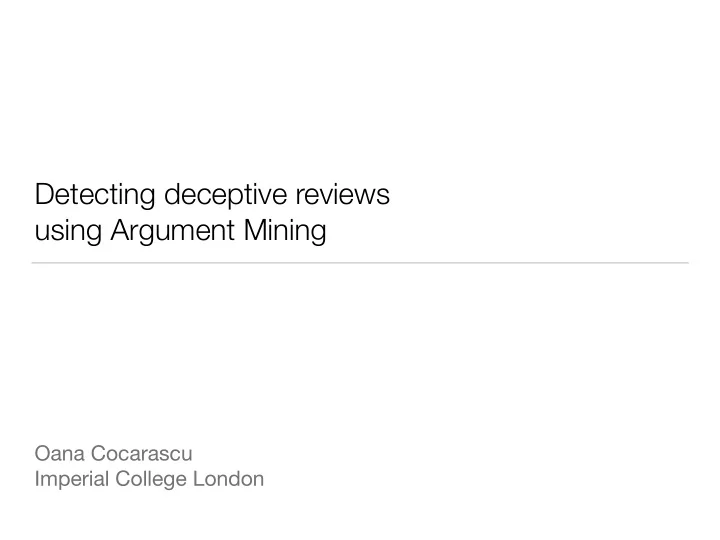

Detecting deceptive reviews using Argument Mining Oana Cocarascu Imperial College London
Truthful or deceptive? Their service was amazing , and we absolutely loved the beautiful indoor pool . I would recommend staying here. The staff was super friendly and helpful and the location was fantastic. Highly recommended! Pathetic and rude. Hotel better find some better employees for their guests to truly enjoy their stay.
Approach • mine Argumentation Frameworks (AFs) • argumentative features for classifiers from dialectical strength
Related work • opinion spam (Ott et al. 2011, Shojaee et al. 2013, Fusilier et al. 2015) • opinion spammers (Lim et al. 2010, Mukherjee et al. 2012) • Argument Mining (Palau & Moens 2011, Lippi & Torroni 2016) • argumentative sentence • argument components • relations between arguments
Overview
Argumentation Frameworks (AFs) • Abstract Argumentation Framework (AAF) • Abstract Bipolar Argumentation Framework (BAF)
Example r 1 : ‘It had nice rooms but terrible food.’ r 2 : ‘Their service was amazing and we absolutely loved the room. They do not offer free Wi-Fi so they expect you to pay to get Wi-Fi...’
Extracting arguments r 2 : ‘Their service was amazing r 1 :‘It had nice rooms and we absolutely loved the but terrible food.’ room. They do not offer free Wi- Fi so they expect you to pay to get Wi-Fi...’ a 21 : service was amazing a 11 : It had nice rooms a 22 : absolutely loved the room a 12 : (It had) terrible food a 23 : they do not offer free Wi-Fi so they expect you to pay to get Wi-Fi
Determine argument polarity a 11 : It had nice rooms (+) a 12 : (It had) terrible food (-) a 21 : service was amazing (+) a 22 : absolutely loved the room (+) a 23 : they do not offer free Wi-Fi so they expect you to pay to get Wi-Fi (-)
Determine support/attack relations relation-based Argument Mining sentiment analysis -> AAF + sentiment analysis -> BAF
Mining AFs for detecting deception • topic-independent AAF • 2 special arguments: G and B • (noun-level) topic-dependent BAF • 1 special argument: G • 1 special argument per topic: G t
Topic-independent AAF • arguments extracted from reviews • 2 special arguments: G and B • attack relation determined by argument polarity
AAF from example a 11 : It had nice rooms (+) a 12 : (It had) terrible food (-) a 21 : service was amazing (+) a 22 : absolutely loved the room (+) a 23 : they do not offer free Wi-Fi so they expect you to pay to get Wi-Fi (-)
Topic-dependent BAF • identify topics (and related arguments) • arguments extracted from reviews • 1 special argument: G • 1 special argument per topic: G t • relations determined using relation-based AM
Topic-dependent BAF a 11 : It had nice rooms (+) Topics a 12 : (It had) terrible food (-) • room a 21 : service was amazing (+) • food a 22 : absolutely loved the room (+) • service a 23 : they do not offer free Wi-Fi so they • Wi-Fi expect you to pay to get Wi-Fi (-)
Topic-dependent BAF - Determining relations
BAF from example a 11 : It had nice rooms (+) a 12 : (It had) terrible food (-) a 21 : service was amazing (+) a 22 : absolutely loved the room (+) a 23 : they do not offer free Wi-Fi so they expect you to pay to get Wi-Fi (-)
Calculating argument strength base score of arguments F - aggregating the argument strength C - combining base score with the aggregated score of attackers/supporters
Calculating argument strength base score of arguments: 0.5 F = C =
Argumentative features impact of review r : |strength given R - strength given R\{r} |
Argumentative features in AAF r 1 - argumentative features AF given R AF given R\{r 1 }
Argumentative features in BAF r 1 - argumentative features AF given R AF given R\{r 1 }
Deceptive reviews - standard NLP features
Results Random Forests Hotel Restaurant Baseline 76.25% 69% AAF 77.75% 71.25% BAF 79.81% 73%
Future work • other AM techniques • semi-supervised approach • compute argument strength
Thank you!
Recommend
More recommend